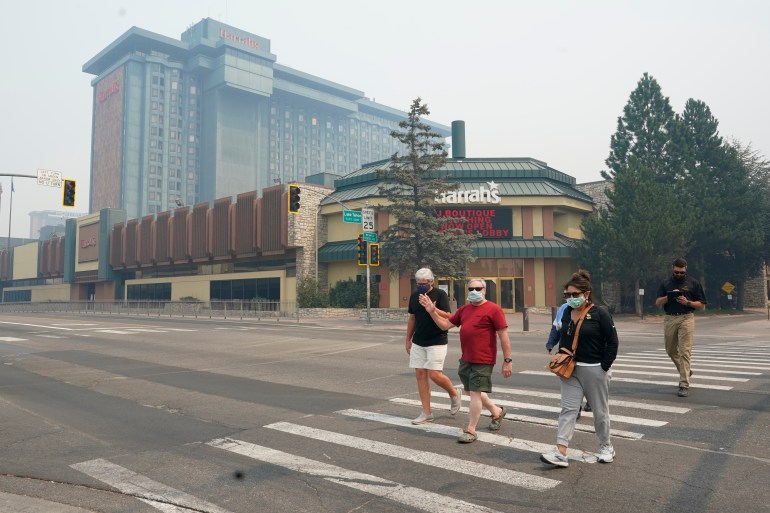Tourist sites threatened by raging US wildfires
The Caldor Fire in California and Greenwood Lake Fire in Minnesota are fuelled by climate change, a new report concludes.

Enormous wildfires in California and Minnesota are forcing tourists to change their plans in two US vacation spots as a new study blames climate change for creating conditions that fuel the massive blazes.
The wildfire has already gutted hundreds of homes and is advancing towards the resort cities of Lake Tahoe as thousands of firefighters tried to box in the flames. On Wednesday, the Caldor Fire was less than 32km (20 miles) east of the lake that straddles the California-Nevada state line.
Keep reading
list of 3 itemsSpanish volunteers remove eucalyptus in bid to prevent wildfires
Paraguay wildfires threaten Indigenous land and protected forests
The Caldor Fire in California is “knocking on the door” of the Lake Tahoe basin, state fire chief Thom Porter said this week, causing ash to rain down and forcing tourists inside to avoid the unhealthy air.
The blaze has scorched more than 510sq km (197sq miles) and destroyed at least 461 homes since August 14 in the Sierra Nevada southwest of the lake. It was 11 percent contained and threatened more than 17,000 structures.
Although there were no evacuations ordered for Lake Tahoe, it was impossible to ignore a blanket of haze so thick and vast that it closed schools for a second day in Reno, Nevada, which is about 100km (60 miles) from the fire.

Meanwhile, US Forest Service officials have extended the closure of the Boundary Waters Canoe Area Wilderness as Minnesota’s largest wildfire doubled in size.
The Greenwood Lake fire burning in the Superior National Forest in northeastern Minnesota grew to about 77sq km (30sq miles) on Monday, and four new smaller fires ignited within the BWCA.
Officials decided to keep the popular forest closed another week, until September 3, dealing a blow to tourists who spent months planning their trips there and to the outfitters and other businesses in the one-million-acre wilderness.
Several fires caused by lightning have burned in the wilderness during this summer’s drought conditions, while the Greenwood Lake Fire has forced the evacuation of about 280 homes and cabins since it was spotted August 15 about 24km (15 miles) southwest of the town of Isabella.
Climate change as culprit
The effects of climate change have fuelled more wildfires during the past 30 years, according to scientists, as warmer and drier conditions will continue to make the weather more extreme and wildfires more destructive.
“Climate change is causing an increase in temperatures, and that increase in temperatures is causing a serious drying trend out in the west,” said Kaitlyn Weber, a data analyst whose group, Climate Central, released a report this week on climate change and fires.
“It’s greatly increasing the risk of more severe wildfires,” Weber told the Reuters news agency.
Climate scientist Michael Wehner said such increases in fire risk have not been limited to the western United States, with countries such as Greece, Turkey, Spain and France now seeing consecutive damaging fire seasons.
US states further east may also find themselves at growing risk, said Wehner, one of the lead authors of an August report from the Intergovernmental Panel on Climate Change.
Minnesota’s Greenwood Fire, for instance, has charred nearly 8,100 hectares (20,000 acres) during the past 10 days.
“I would expect that there’s an increase for fire risk throughout the mid-latitudes,” Wehner said. “The dry climates are always more at risk for these types of things, but you can have forest fires in the eastern United States.”
Weber, of Climate Central, said that as climate change drives hotter temperatures in many states, fires are also becoming a risk in more places.
The report is “kind of a warning sign that we really need to pay attention to that”, she said.